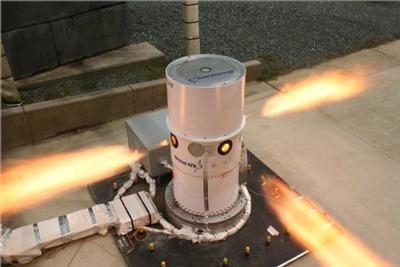Wed, May 03, 2017
Test Demonstrates Attitude Control Motor Design Meets Human-Rated Requirements
Another milestone has been reached in the development of the Attitude Control Motor (ACM) for NASA’s Orion spacecraft Launch Abort System (LAS). Members of the NASA and Lockheed Martin team were on hand to witness the successful ACM test conducted by Orbital ATK, which demonstrated the motor’s power to steer the LAS during a mission-abort scenario.

This recent test is part of a design, analysis and test series focused on qualifying the ACM for crewed-flight missions. Initial data from the test show the motor is very capable of fulfilling its critical role in the Launch Abort System.
“With the Orion spacecraft and Space Launch System, NASA has taken up the challenge of not just opening up space exploration, but making it as safe as possible for our astronauts,” said Pat Nolan, Vice President and General Manager of the Missile Products Division of Orbital ATK’s Defense Systems Group. “Orbital ATK is proud to support that vision with our innovative and reliable technology. The success of today’s test brings us that much closer to seeing this vision realized.”
Orbital ATK has been working with Lockheed Martin and NASA to leverage the company’s extensive advanced propulsion and controls capabilities deployed in other mission critical applications to provide steering thrust that can be reliably operated in an instant as part of the Orion crew-escape system. Orbital ATK also produces the main Launch Abort motor, providing the necessary thrust to pull the crew module safely away from the vehicle. These items have been in development for many years, and will be ready to support the first Space Launch System flight late next year.
The Orion spacecraft is launched by NASA's Space Launch System and built to take humans farther into space than they've ever been. Lockheed Martin is leading the industry team charged with developing Orion under contract to NASA. Orbital ATK’s Attitude Control Motor uses a solid propellant gas generator with eight proportional valves to steer the LAS in the event of a mission-abort scenario.
(Image provided with Orbital ATK news release)
More News
He Attempted To Restart The Engine Three Times. On The Third Restart Attempt, He Noticed That Flames Were Coming Out From The Right Wing Near The Fuel Cap Analysis: The pilot repor>[...]
Make Sure You NEVER Miss A New Story From Aero-News Network Do you ever feel like you never see posts from a certain person or page on Facebook or Instagram? Here’s how you c>[...]
From 2009 (YouTube Edition): Leading Air Show Performers Give Their Best Advice for Newcomers On December 6th through December 9th, the Paris Las Vegas Hotel hosted over 1,500 air >[...]
Aero Linx: NASA ASRS ASRS captures confidential reports, analyzes the resulting aviation safety data, and disseminates vital information to the aviation community. The ASRS is an i>[...]
“For our inaugural Pylon Racing Seminar in Roswell, we were thrilled to certify 60 pilots across our six closed-course pylon race classes. Not only did this year’s PRS >[...]
 NTSB Final Report: Rutan Long-EZ
NTSB Final Report: Rutan Long-EZ ANN FAQ: Turn On Post Notifications
ANN FAQ: Turn On Post Notifications Classic Aero-TV: ICAS Perspectives - Advice for New Air Show Performers
Classic Aero-TV: ICAS Perspectives - Advice for New Air Show Performers ANN's Daily Aero-Linx (06.28.25)
ANN's Daily Aero-Linx (06.28.25) Aero-News: Quote of the Day (06.28.25)
Aero-News: Quote of the Day (06.28.25)



